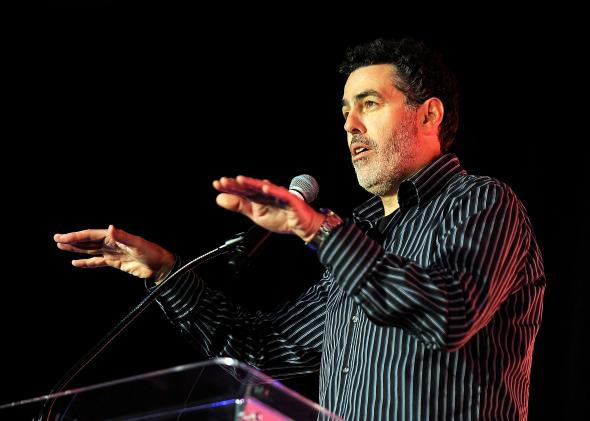As the fight against patent trolls grinds on, stymied by government inability (or unwillingness) to fix a malfunctioning patent system, anti-troll advocates could take cold comfort this week from a particularly amusing press release.
Personal Audio has been demanding cash from broadcasters large and small for allegedly infringing its patent on delivering episodic online content—the so-called “podcasting patent.” The company, which is based in Texas, makes no podcasts and does little but litigate against companies that it says are using its patents without a license, including major television video broadcasters like CBS and NBC.
But this week, the company announced that it wanted to drop a long-running case against comedian and podcaster Adam Carolla. Why? Well, he just isn’t making that much money.
“When Personal Audio first began its litigation, it was under the impression that Carolla, the self-proclaimed largest podcaster in the world, as well as certain other podcasters, were making significant money from infringing Personal Audio’s patents. After the parties completed discovery, however, it became clear this was not the case. As a result, Personal Audio began to offer dismissals from the case to the podcasting companies involved, rather than to litigate over the smaller amounts of money at issue.”
Earlier this year, Personal Audio also dismissed podcasters Togi Net and How Stuff Works from the case.
Carolla, for his part, refused Personal Audio’s offer to dismiss. A statement, which appears on the page he’s using to fundraise to defend the lawsuit, says that although it’s unable to comment on the proceedings, Carolla’s podcasting company Lotzi Digital Inc. “intends to continue to vigorously defend Personal Audio’s lawsuit and to pursue its counterclaims against Personal Audio, which include a request that the Personal Audio patent be invalidated so that Personal Audio cannot sue other podcasters for infringement.”
As Charles Duan, director of the Patent Reform Project at Public Knowledge, wrote, if the case is simply dismissed, then the patent cannot be found by the courts to be invalid. Carolla “is fighting on behalf of the whole public, everyone who makes, uses, and enjoys podcasts.”
So how did a company that once released magazine articles on cassette tapes (“kind of a crude form of podcasting, you might say,” someone from Personal Audio once suggested) get a patent on podcasting? Just by filing a claim to the Patent Office asserting that it came up with a “system for disseminating media content representing episodes in a serialized sequence.” That patent was granted in 2012, and at the time, Personal Audio put out a statement claiming that the company invented podcasting in 1996.
But in the Electronic Frontier Foundation’s petition to have the Patent Office review and invalidate the patent, the advocacy group suggests that the medium of “podcasting” had already been online about three years earlier—Carl Malamud and his “Geek of the Week” podcast launched in 1993. As EFF Staff Attorney Daniel Nazer said, “If you look into the history of podcasting, you won’t see anything about Personal Audio.” Early this year, the Patent Trial and Appeal Board said that the EFF’s petition had a “reasonable likelihood” of success.
Personal Audio’s lawsuit is more than an irritant to podcasters. It could also be highly damaging—law suits are expensive, and as Personal Audio is discovering, podcasting is not often a high margins venture. That squares with broader trends—55 percent of companies served by patent trolls make $10 million per year or less. For this reason, many of those targeted settle or go out of business rather than fight.
Carolla’s case, as well as those of the TV broadcasters’, should be held before an East Texas court in September, Joe Mullin wrote in Ars Technica. Unfortunately, the cases will likely be heard before the EFF’s petition is considered by the patent office—but either way, Personal Audio’s lawsuits will hopefully find some real resolution this year.
In the meantime, we can derive some amusement from Personal Audio’s quixotic quest. Mostly because, as Mike Masnick points out on TechDirt, representatives of Personal Audio show an uncommon willingness to talk to journalists.
Take a 2013 episode of This American Life, “When Patents Attack … Part Two!” Reporter Zoe Chace convinced Jim Logan and Richard Baker of Personal Audio to be interviewed. When she pointed out that This American Life had not paid them any license fee, this gem was the result:
Zoe Chace: So are we doing something illegal right now, though?
Richard Baker: I wouldn’t comment on that.
Man: I wouldn’t comment on it.
Jim Logan: We don’t–I don’t comment on the legalities.
For a company that seems to exist solely to exercise the limits of the U.S. legal system, not commenting on the legalities of the case is like Kim Kardashian refusing to be photographed.
